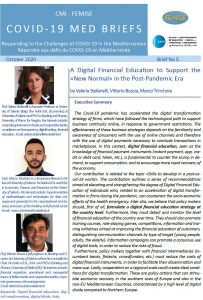
The recent coronavirus crisis threatens the health, economies and societies of all countries. In Southern and Eastern Mediterranean countries, the fight against the pandemic is even more complicated. Cooperation and EU-Med strategies in key sectors are needed. Therefore, the Center for Mediterranean Integration (CMI) and FEMISE join forces and launch their joint series of Policy Briefs called “COVID-19 MED BRIEFS” to pave the way for thematic analyses and policy relevant recommendations.
 The fifth COVID-19 MED BRIEF, entitled “A Digital Financial Education to Support the «New Normal» in the Post-Pandemic Era” by Valeria Stefanelli, Vittorio Boscia and Marco Trinchera is available here
The fifth COVID-19 MED BRIEF, entitled “A Digital Financial Education to Support the «New Normal» in the Post-Pandemic Era” by Valeria Stefanelli, Vittorio Boscia and Marco Trinchera is available here
Summary : The Covid-19 pandemic has accelerated the digital transformation strategy of firms, which have followed the technological path to support business continuity online, in response to government restrictions. The effectiveness of these business strategies depends on the familiarity and awareness of consumers with the use of online channels and therefore with the use of digital payments necessary to conclude transactions in marketplaces. In this context, digital financial education, seen as the knowledge of financial payment instruments (instant payment, app, credit or debt card, token, etc.), is fundamental to counter the slump in demand, to support consumption, and to encourage more rapid recovery of the economy.
Our contribution is related to the topic «Skills to develop in a post-covid-19 world». The contribution outlines a series of recommendations aimed at elevating and strengthening the degree of Digital Financial Education of individuals who, related to an acceleration of digital transformation in firms during the pandemic, can counteract the socio-economic effects of the health emergency. Inter alia, we believe that policy makers should, first of all, formulate a digital financial education strategy at the country level. Furthermore, they must detect and monitor the level of financial education of the country over time. They should also promote training courses, role-playing games, competitions, information and training initiatives aimed at improving the financial education of customers, distinguishing communication channels by type of target (young people, adults, the elderly). Information campaigns can promote a conscious use of digital tools, in order to reduce the risks of fraud.
Furthermore, policy makers together with financial intermediaries (incumbent banks, fintechs, crowdfunders, etc.) must reduce the costs of digital financial instruments, in order to facilitate their dissemination and mass-use. Lastly, cooperation on a regional scale could create ideal conditions for digital transformation. These are policy actions that can stimulate economic recovery in the southern area of Europe and also in the non-EU Mediterranean Countries, characterized by a high level of digital divide compared to Northern Europe.
This Policy Brief is produced as part of the series of Policy Briefs on « Responding to the Challenges of COVID-19 in the Mediterranean » that is undertaken in partnership between FEMISE and the Center for Mediterranean Integration (CMI).
The views expressed in this Brief are those of the authors and do not reflect the views of CMI or FEMISE. The contents have not been subjected to verification by CMI or FEMISE and their publication does not reflect ownership by CMI or FEMISE.


